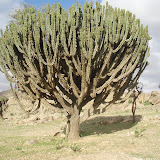 |
| Red Sea Hills |
my apprehension became true: after a 6 days trek the police arrested me in a small village in the middle of nowhere. they didn't suspect me of anything, but somehow my permit was not valid for this area and they sent me back to port sudan.
the tour itself was great, with very diversified landscape: i started in erkowit, a village inside surprisingly green landscape on the edge of a big plateau. the hills looked like bunches of rocks that were just now thrown on the floor, without any erosion of wind and water. i stayed there one day to recover from some fever and diarroe. the weather there was quite cold and windy, sometimes even with tiny raindrops though the rainy season is in summer. then i met the typical red-brown eroded mountains with vegetation only on the bottom of the valleys like i knew it from earlier trips like sinai and ethiopia. after that i crossed a flat desert, fighting with sandstorms for a whole day to reach again the escarpment of the plateau to descent to the village where my tour ended forcefully.
but maybe the police even saved my life as they later told me in port sudan that there are landmines on the route where i wanted to continue. on the other hand the local people (who have to know about it better) didn't know about the mines so i think they only searched for a reason why i should be thankful to them, and not as angry as i appeared to them.
the landmines are the remains of a civil war in this region that ended with a peace agreement in october last year. the local ethnics, beja and rashaida, similar to darfur, felt marginalized and couldn't participate in the national politics, before the agreement. like in somalia, ethiopia and maybe other countries virtually all rebel groups in sudan are sponsored by the eritrean government. in port sudan i could met some leaders of the beja faction of the rebel group. they told me that they are very disappointed by the agreement, because most of the new government posts granted to them were occupied by the asmara-part of the group, which is rather interested in better relations between eritrea and sudan than the development of red sea region. the region is blessed with a lot of mineral resources like gold and uran and the most important oil pipeline from the oil fields in the south to the sea ports is crossing it, but the local people haven't seen any benefits from it.
the beja, who inhabit the area where i trekked are said to be very hostile towards foreigners, something i could not confirm. they were very friendly and rather worried about me and tried to convince me that it is too dangerous to go there alone. when their arguements came to an end they told me about lions living here, but i knew that the area is lion-free. sometimes i had communication problems because some of them speak only a few words arabic. most of them are raising goats, in the lowlands also camels.
today i had to apply again for a travel permit for another area close to port sudan. this time, they also checked and searched all the stuff of my bag. they confiscated stuff that were suspicious to them: some articles about the rebel groups (i can understand this) and some postcards from austria (!) that i use as gifts for the people i meet along the way. they said they'll investigate it and later , after my 2nd trekking tour will give it back to me. i'm anxious to the investigation's result.

1 Kommentar:
ich kenne die gegend war vor 20 jahren mit dem auto dort (eigentlich bin ich durch afrika gefahren)
und in port sudan oder im ganzen sudan war andauerd zoff mit irgendwelchen permits, fotoerlaubnissen, etc, kontrollen sind überall gewesen, mir wurde ab und zu irgendein typ zur "kontrolle" ins auto gesetzt, der war dann happy wenns was zum essen gab... und jede menge papierkram verschwindet dann irgendwo. ist wohl noch ein relikt von den britischen kolonialherren diese bürokratie.
ansonsten wünsche ich viel glück für die weitere reise und ich werde den blog verfolgen
Kommentar veröffentlichen